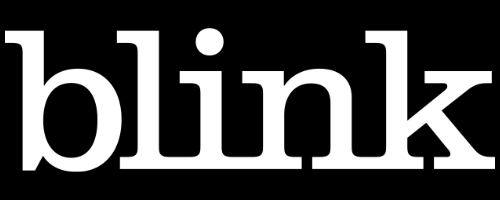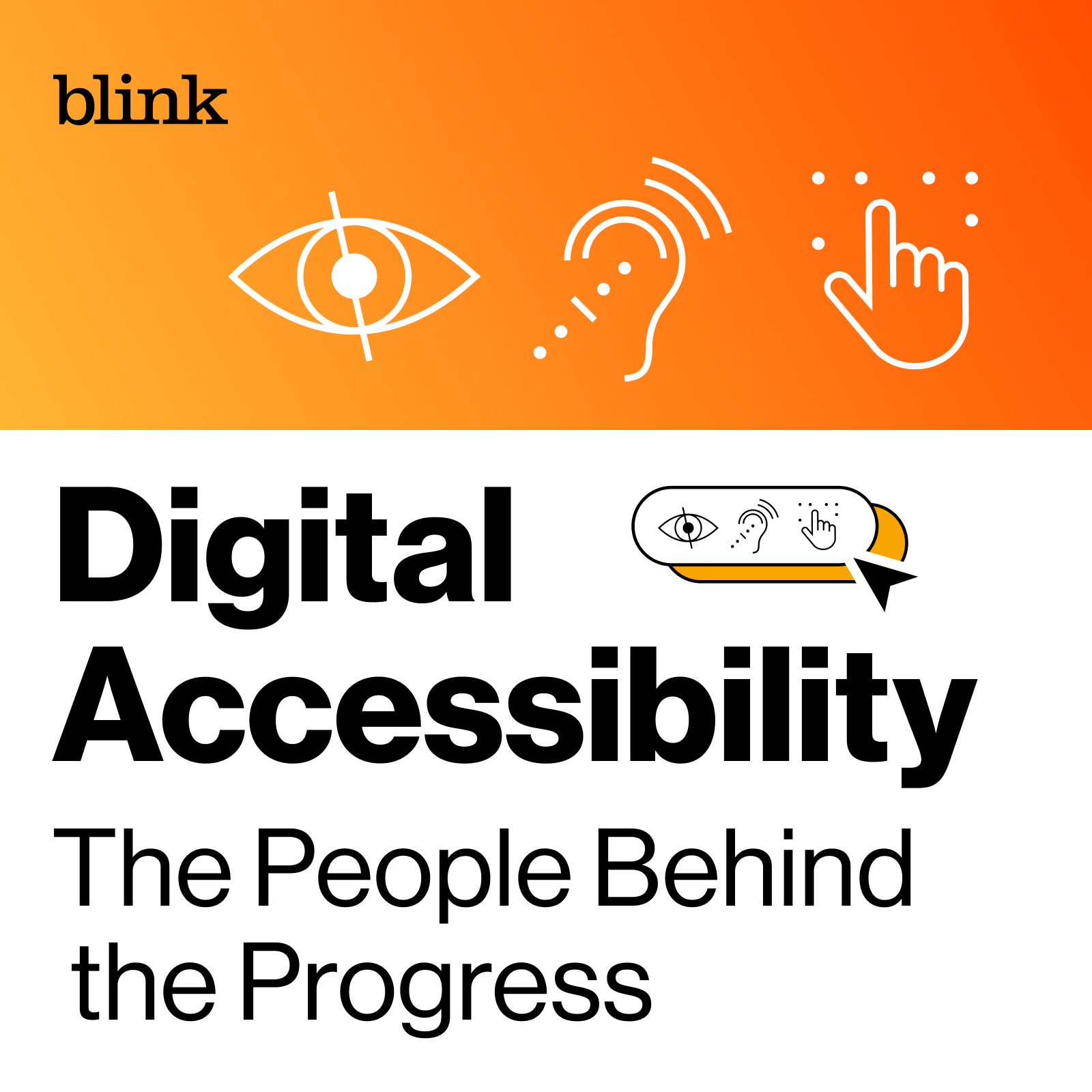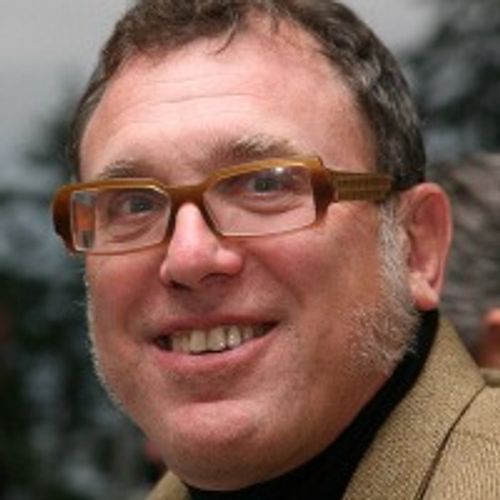Episode 3
Incorporating Accessibility into UX Education from the Beginning
Reginé Gilbert, NYU Assistant Professor
Reginé talks about growing up with a family member who is deaf and taking that awareness into her UX studies and the digital accessibility community. She describes her research evaluating the accessibility associated with immersive technologies.
Mentioned in this episode:
Info about Accessibility at Blink
Transcript
(dramatic upbeat music)
Speaker:- Hello, this is Digital Accessibility
Speaker:for People Behind the Progress.
Speaker:I'm Joe Welinske,
Speaker:the creator and host of this series.
Speaker:And as an accessibility professional myself,
Speaker:I find it very interesting
Speaker:as to how others have found their way into this profession.
Speaker:So let's meet one of those people right now
Speaker:and hear about their journey.
Speaker:(upbeat music)
Speaker:Well, let's get into this interview
Speaker:and I'm very pleased to be talking today
Speaker:with Regine Gilbert.
Speaker:Hello, Regine.
Speaker:How are you doing today?
Speaker:- Hi, it's good to be here.
Speaker:I'm so happy to be talking to you today.
Speaker:- Yeah, well, we hadn't talked before,
Speaker:so that's really good to able to meet you in this format.
Speaker:And I'm in my home office
Speaker:in Vashon, Washington,
Speaker:which is an island near Seattle.
Speaker:You either have a beautiful background
Speaker:or a beautiful place,
Speaker:but why don't you let us know
Speaker:where you're talking to us from?
Speaker:- Yeah, so I'm actually sitting in my office at NYU
Speaker:in Brooklyn, New York.
Speaker:- All right, well, I'm glad
Speaker:we're able to get together for this.
Speaker:And probably a good place to start is, you know,
Speaker:if you just talk a little bit
Speaker:about, you know,
Speaker:the work that you're doing right now
Speaker:and then we kinda go from there.
Speaker:- Sure, so I'm currently an industry assistant professor
Speaker:in the integrated design and media program
Speaker:that's part of the Tandon School of Engineering.
Speaker:And I teach user experience design,
Speaker:as well as I co-teach an assistive tech class
Speaker:with Gus Chalkias
Speaker:and we teach students about the assistive tech
Speaker:that blind and low vision folks use.
Speaker:Gus is blind.
Speaker:And then I bring in the UX piece and my,
Speaker:I mean, he is definitely way more of an expert
Speaker:on assistive tech than me,
Speaker:but I have learned so much from him
Speaker:and teaching the classes is a lot of fun.
Speaker:And this upcoming semester,
Speaker:I'm actually going to be teaching
Speaker:a voice user interface class for the first time
Speaker:and incorporating accessibility into it.
Speaker:- Well, everything you just talked about
Speaker:is really progressive.
Speaker:Is that department that you're in,
Speaker:you know, particularly pointed
Speaker:toward providing that type of curriculum content
Speaker:or is it something that you've thought
Speaker:and it helped foster there?
Speaker:- Yeah, so this department I really love
Speaker:because it's really diverse
Speaker:in the learnings that students can get.
Speaker:My colleagues are, you know,
Speaker:experts in virtual reality, in augmented reality,
Speaker:in wearables and technology and art,
Speaker:you know, and like biology,
Speaker:and really like working with plants and technology.
Speaker:So there's like all kinds of things
Speaker:that folks are working on in my department.
Speaker:So students have a lot of options when it comes to learning.
Speaker:- Well, yeah, I wanted to talk more
Speaker:about the work that you're doing now,
Speaker:but one of the themes
Speaker:of this series of interviews that I'm doing
Speaker:is to look at the journey
Speaker:that people have taken to
Speaker:that has resulted in where they are today.
Speaker:Maybe you could think about, you know,
Speaker:a place that you'd like to pick as a starting point.
Speaker:It doesn't have to be accessibility specific.
Speaker:You know, and just maybe help us understand
Speaker:what some of the formative things were
Speaker:that got you on the journey to where you are today.
Speaker:- Yeah, one of the things that had a huge impact on me
Speaker:when I was growing up is my cousin, Tammy, is deaf.
Speaker:And like interacting with her,
Speaker:learning a little bit of sign language,
Speaker:getting to see how she is in the world,
Speaker:and that really had a lot of influence on me
Speaker:saying, you know,
Speaker:I think I started questioning when I was young,
Speaker:like, "Why isn't more stuff better?"
Speaker:Like, "Why isn't this thing better?"
Speaker:Or "Why isn't this thing better?
Speaker:And why can't we do more things better to communicate?"
Speaker:And then, you know, fast forward.
Speaker:Years later, I worked,
Speaker:I worked in information technology
Speaker:for a lot of years
Speaker:and I got bored
Speaker:and started taking UX classes.
Speaker:And in my UX class,
Speaker:there was one slide about accessibility.
Speaker:This is what I remember clearly.
Speaker:And I think that sparks something else in me.
Speaker:And that led me to wanting to learn more
Speaker:and going to a meetup.
Speaker:And from there,
Speaker:it's just I dove right on in
Speaker:and got really interested in learning,
Speaker:in doing incorporating it into my UX job.
Speaker:I created guidelines at one job
Speaker:and nobody asks for them.
Speaker:I created accessibility guidelines
Speaker:because I was so interested in it.
Speaker:I really wanted people to apply it to their work.
Speaker:And then I started teaching UX in 2015 at general assembly.
Speaker:And I incorporated
Speaker:accessibility into my courses
Speaker:by having my students do a lot of assumptions
Speaker:around what in particular blind folks might do
Speaker:when they're in the kitchen.
Speaker:And I would have my students come up with a concept,
Speaker:you know, sketch it out.
Speaker:And I say, "You know,
Speaker:you should be able to describe this."
Speaker:And then I actually brought in
Speaker:folks who were blind to critique.
Speaker:And that really was informative for my students to say,
Speaker:"Oh, you know,
Speaker:this is user experience, right?
Speaker:You have to talk to people.
Speaker:You can't just assume
Speaker:because all of their ideas
Speaker:were busted, right?
Speaker:Like they realized, you know,
Speaker:we can't really make stuff
Speaker:if we don't involve
Speaker:and talk to the people who this applies to.
Speaker:- Well, you know, just going back a little bit,
Speaker:you know, before the teaching to that work
Speaker:that you were doing in UX for organizations,
Speaker:I know, you know, as a lot of us,
Speaker:you know, that's a logical stuff for a lot of us,
Speaker:but sometimes, you know, we'll do things,
Speaker:but then we run into obstacles at an organization
Speaker:that maybe isn't ready to put in the resources.
Speaker:Some of the Fortunate few
Speaker:find that they're, you know, immediately supported.
Speaker:What was that experience like for you?
Speaker:You're not necessarily, you know,
Speaker:specifics about an organization,
Speaker:but I mean what was your experience there?
Speaker:- I mean, I've had both
Speaker:where people are very supportive
Speaker:and where people just don't care.
Speaker:So when, you know, I was getting support
Speaker:and the higher ups were like,
Speaker:"Yeah, let's do all of the things."
Speaker:It just made my life easier.
Speaker:Made my job easier.
Speaker:It was easier for communication
Speaker:between the developers and our teams.
Speaker:And when we didn't,
Speaker:you know, have support,
Speaker:it was a challenge.
Speaker:It was a huge challenge to kind of fight for what's right,
Speaker:but then have to back down.
Speaker:- And in those situations,
Speaker:what type of strategies did you use?
Speaker:Was it like, you know, return on investment metrics
Speaker:about maybe, you know, audience that was new,
Speaker:or was it kind of more the stick versus the carrot
Speaker:related to legal or what.
Speaker:You know, what were some of the ways
Speaker:that you were able to build support for that
Speaker:or build a case for your work?
Speaker:- The ways that I built a case
Speaker:was search engine optimization
Speaker:and partnering with the marketing teams
Speaker:in the search engine folks.
Speaker:That was one that was very successful.
Speaker:Another way, yeah, is to dangle that carrot
Speaker:about the legal reasons why,
Speaker:you know, we should be accessible.
Speaker:And then I think the biggest and best strategy
Speaker:is to just ask questions,
Speaker:and to ask questions
Speaker:that are promoting accessibility
Speaker:but without saying the words.
Speaker:Because what I found in my previous work experience
Speaker:is when I said accessibility,
Speaker:automatically people would shut down.
Speaker:Say that's too hard, right?
Speaker:So then it was asking the questions.
Speaker:You know, "Are we sure about these colors?"
Speaker:"Are we sure we wanna do this thing, right?"
Speaker:"Have we thought about this, right?"
Speaker:So just asking questions
Speaker:related to what we were working on
Speaker:and seeing what people would answer.
Speaker:'Cause then I could say,
Speaker:"Oh, we could maybe try this."
Speaker:Or, you know.
Speaker:So that was my way around.
Speaker:I think asking questions
Speaker:is the best thing anyone can do
Speaker:to get people to think,
Speaker:I like to say, you know, as an educator,
Speaker:I cannot teach anybody anything.
Speaker:I can only hope that the questions that I ask
Speaker:provoke people to think.
Speaker:- Well, it sounds like a great approach.
Speaker:And, you know, you mentioned the SEO,
Speaker:which is something that,
Speaker:you know, that I've delved into
Speaker:related to accessibility.
Speaker:But I think a lot of people,
Speaker:even in the accessibility area
Speaker:may not, you know,
Speaker:understand the how's.
Speaker:How the two pieces can really work together
Speaker:with accessibility components
Speaker:adding signals to search engine optimization.
Speaker:And was that something
Speaker:that you just like identified individually
Speaker:or was there GF some colleagues in marketing
Speaker:where you explored this area?
Speaker:- Oh, yeah, so in one particular instance,
Speaker:I work directly
Speaker:with the search engine optimization person,
Speaker:like the person in the company.
Speaker:And I was like.
Speaker:And he was like,
Speaker:"I know that accessibility helps SEO.
Speaker:I don't know how it does it exactly,
Speaker:but I know it works."
Speaker:And so I said, "Okay, great."
Speaker:You know, he was so happy
Speaker:to have someone,
Speaker:you know, support him and he supported me.
Speaker:And then we got marketing involved
Speaker:and marketing's like, "Yeah.
Speaker:We need to be at the top of Google.
Speaker:So how can we do this?"
Speaker:- Well, now that you're involved
Speaker:in the work at NYU
Speaker:and in teaching regularly,
Speaker:how does that kind of manifest itself
Speaker:with your students?
Speaker:Are they interested specifically in that topic
Speaker:or they maybe are just
Speaker:exploring it or a mix
Speaker:or kinda how is that set up where you're at?
Speaker:- Yeah, so I teach user experience design primarily,
Speaker:and I incorporate accessibility from day one.
Speaker:Like we started talking about it from the beginning.
Speaker:And therefore, the students work on,
Speaker:my students will work on
Speaker:individual projects and team projects.
Speaker:And their team projects are always with a real-life client.
Speaker:Both our team and individual projects
Speaker:have accessibility components in them
Speaker:from the beginning,
Speaker:from the research phase,
Speaker:from the planning phase.
Speaker:And just this past semester,
Speaker:and even this summer,
Speaker:my students are working on a project
Speaker:that is through Arista Labs,
Speaker:and Arista Labs received a grant from NASA
Speaker:to make the eclipse
Speaker:that are upcoming in the next couple years
Speaker:accessible in particular to the blind
Speaker:and low vision community through sound.
Speaker:And so this particular project
Speaker:involves a lot of data and sound.
Speaker:And so my students last semester did a lot of research
Speaker:in regards to best practice.
Speaker:They did user interviews.
Speaker:They did, you know,
Speaker:looking at scholarly articles.
Speaker:And this summer,
Speaker:my grad research assistant and I
Speaker:are working on the designs.
Speaker:And to do that, we have been working
Speaker:with subject matter experts,
Speaker:as well as people getting input from folks
Speaker:in the blind and low vision community.
Speaker:So we are...
Speaker:And my teaching is also practice
Speaker:because we're always working
Speaker:with real-life clients every semester.
Speaker:- Well, one of the things that I read recently
Speaker:was the article that I saw on LinkedIn,
Speaker:which was where you're talking about
Speaker:developing accessibility guidelines for extended reality.
Speaker:And that was an area.
Speaker:I mean, there's so many areas of accessibility.
Speaker:It's hard to keep up with everything.
Speaker:But it was one that I hadn't really been familiar with,
Speaker:thought about at all,
Speaker:but I found the article,
Speaker:you know, really illuminating.
Speaker:Maybe talk a little bit about that technology
Speaker:and your work specifically in that area.
Speaker:- Sure, you know, in my past life,
Speaker:I had a consulting business.
Speaker:And I worked in a coworking space
Speaker:with a group that was working on augmented reality.
Speaker:And they were like, "We need UX help.
Speaker:And I was like, "What is this stuff you're working on?
Speaker:It seems cool."
Speaker:And so I ended up doing some usability testing
Speaker:for this augmented reality company.
Speaker:And that kinda got me
Speaker:into what they call XR.
Speaker:Some people, it's extended reality.
Speaker:So extended reality XR is an umbrella term
Speaker:for virtual reality,
Speaker:augmented reality, mixed reality,
Speaker:and any sort of immersive technology
Speaker:or anything that's using spatial computing.
Speaker:AI could fall in that umbrella, too.
Speaker:And so I started thinking about,
Speaker:and this came from last summer,
Speaker:what I was talking to Gus,
Speaker:my co-teacher for the assistive technology class,
Speaker:and I was talking to him about Pokemon Go.
Speaker:And he said,
Speaker:"I wish I could play Pokemon Go."
Speaker:And then I thought to myself,
Speaker:"Well, okay, Gus is blind,
Speaker:and he can't play Pokemon Go because it's not accessible.
Speaker:Why isn't it and why isn't augmented reality accessible?"
Speaker:And so last summer,
Speaker:my students worked with Gus
Speaker:and a company called Rose Digital
Speaker:to create concepts around accessible augmented reality.
Speaker:So they didn't build anything,
Speaker:but they did create concepts.
Speaker:And that had me thinking about accessibility overall
Speaker:in the XR space and where does it start?
Speaker:You know, "Where do you start?"
Speaker:And he said, "Well, people start with the tools."
Speaker:And are these tools accessible
Speaker:not just from a standpoint disability,
Speaker:but accessible from a cost perspective?
Speaker:And so my grad assistant,
Speaker:Saki Asakawa, and I
Speaker:went through as many tools
Speaker:as we could find the popular tools.
Speaker:And we looked at about 60 tools,
Speaker:specifically looking at the price,
Speaker:looking at the hardware needed,
Speaker:software needed to run these programs,
Speaker:and if there was any accessibility associated with them.
Speaker:And from there,
Speaker:we ended up writing this article
Speaker:and we created a subway map,
Speaker:which this upcoming semester
Speaker:I hope I can make in a tactile version,
Speaker:but we created a subway map
Speaker:and the subway map lists out
Speaker:what's free, what costs money,
Speaker:what has accessibility related.
Speaker:And each subway line has a purpose.
Speaker:So there's, you know,
Speaker:for like drawing or things of that nature.
Speaker:So that's kind of the long story of how I got into that.
Speaker:And in addition to that, I'm part of XR Access,
Speaker:which was started by Cornell Tech,
Speaker:and it's really,
Speaker:it's a large group working to make sure
Speaker:that accessibility is getting built into,
Speaker:you know, this emerging technology
Speaker:that a lot more people are using.
Speaker:And I'm also doing a research with design patterns
Speaker:with an organization called Vail
Speaker:and it's researchers from all over the world
Speaker:examining design patterns with different tiles.
Speaker:And then I'm working on a second book,
Speaker:which is I'm co-authoring with Doug North Cook.
Speaker:And it's about the human side of spatial computing
Speaker:where we will talk about accessibility in there.
Speaker:So yeah, that's in a nutshell
Speaker:how I got into the XR Suisse
Speaker:and what I'm doing now.
Speaker:- Well, yeah, that's a great story to hear about that.
Speaker:And it's obviously gonna be something
Speaker:that we're going to be learning about
Speaker:and working with more and more moving into the future.
Speaker:You briefly mentioned, you know, a new book
Speaker:and some things that you're working on.
Speaker:Maybe talk a little bit about, you know,
Speaker:kinda what future plans
Speaker:or things that you're currently really passionate about,
Speaker:anything you can share about your latest projects.
Speaker:- Yeah, sure.
Speaker:So the NASA soundscapes project
Speaker:is an ongoing project.
Speaker:It's a five-year project
Speaker:and my students will be every semester
Speaker:working on something different with the project.
Speaker:And my research
Speaker:around inclusive and accessible XR,
Speaker:it continues I'm hoping in the coming time.
Speaker:Actually, because of the pandemic,
Speaker:I felt a little thrown off with, "Where do I go?"
Speaker:"What do I do if I'm not able to be with people?"
Speaker:So what I'm working on now
Speaker:or what I've been working on over the summer
Speaker:is looking at inclusiveness and accessibility
Speaker:for different titles,
Speaker:specifically with one type of headset.
Speaker:So it's my hope to expand that,
Speaker:to try other headsets and see how that goes.
Speaker:And in addition,
Speaker:continue working and researching for my book
Speaker:and getting real understanding
Speaker:of the layout of the space
Speaker:and really the human side of things
Speaker:and how we can make these experiences
Speaker:overall more accessible,
Speaker:not just from a disability perspective,
Speaker:but from a true inclusive perspective.
Speaker:- Well, yeah, obviously keep yourself really busy.
Speaker:And I wanna thank you for taking time
Speaker:out of your busy schedule to chat with me
Speaker:and good luck with your book.
Speaker:And hopefully we can meet some time in the physical world,
Speaker:but if not, it's really great chatting with you.


